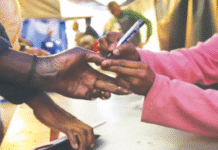Nobel Prize winner Muhammad Yunus is not the father of micro-credit. Neither does this popular development scheme provide a panacea for the poverty-stricken, says an article in ‘Dawn’.
The article entitled “Microfinance: Time for Soul-searching” by Ghazal Zulfiqar says microcredit was introduced in Pakistan by Akhtar Hameed Khan in the early 1970s.
In Bangladesh, BRAC began to offer small-scale credit a few years before the idea is said to have struck Yunus.
And the Boston-based ACCION International introduced microcredit in Latin America a couple of years before Yunus started the Grameen Bank.
“What no one will deny though is that Yunus has been the iconic face of microcredit since the 1980s,” the article says.

It was Yunus who claimed microcredit would relegate poverty to a museum by the year 2030. It was also Yunus’ Grameen Bank that is associated with the catchphrase ‘the poor always pay back’, and it was none other than Yunus who first proposed that, ‘credit is a basic human right’.
“What is surprising is that people listened to him, even when he grandly claimed microcredit would relegate poverty to a museum. The list of people who listened is as good as it gets – it includes the Nobel Peace Prize Committee, the Clintons, members of the US Senate and House of Representatives, the United Nations, the World Bank and a long line of important academicians. There are several theories behind why people paid attention, why it made sense to play up the contributions Yunus claimed microcredit had made in putting a dent on poverty in Bangladesh and elsewhere,” the article says.
Zulfiqar quotes Bengali anthropologists, Amin ur Rahman and Lamia Karim about women borrowers in Bangladesh being pressurized to repay their loans and threatened with public shaming and ‘house breaking’ in case of delinquency.
Research also found that the majority of the loans made out to poor women in Bangladesh were taken from them by their husbands, or if the women refused to take a loan they would be coerced by their men until they did so, the article says.
It blows the claim of microcredit being a panacea by referring to randomised control trials in Andhra Pradesh in India.
“Researchers from the Massachusetts Institute of Technology (MIT) randomly selected a group of microcredit recipients and compared their experiences to another randomly selected group that was not provided with microcredit. They found that 15 to 18 months after the intervention, there were no significant differences between the two groups in terms of their health, education or women’s empowerment.”
A host of other studies, including replications of the randomised control trials in other countries and regions, confirmed that microcredit neither reduced poverty nor did it empower women, the article says.
“Surprisingly though, as microcredit has gone in and out of favour, Yunus continues to be considered too sacred to touch. The voices in his support have become louder with time as Sheikh Hasina’s government continues its attempts to cut him down to size.”
The article says Grameen, with 8.4 million borrowers, is certainly a giant among giants in a country where NGOs form a ‘shadow state’.
“A larger concern about Grameen and Yunus is that they are backed by powerful international media and marketing campaigns, which does not bode well for Bangladesh either politically or economically. While microcredit may have improved some lives, most people have realised by now that microcredit is no panacea to poverty or women’s deprivations. To allow such an institution to bypass regulation, economic and social policy at the national and local level is dangerous.”
Source: Bd news24









